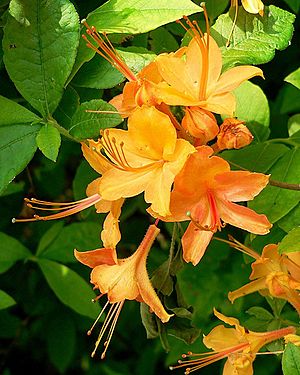Flame azalea facts for kids
Quick facts for kids Rhododendron calendulaceum |
|
|---|---|
 |
|
| Rhododendron calendulaceum at Craggy Gardens, North Carolina | |
| Scientific classification | |
| Kingdom: | |
| (unranked): | |
| (unranked): | |
| (unranked): | |
| Order: | |
| Family: | |
| Genus: | |
| Subgenus: |
Pentanthera
|
| Section: |
Pentanthera
|
| Species: |
R. calendulaceum
|
| Binomial name | |
| Rhododendron calendulaceum (Michx.) Torr.
|
|
Rhododendron calendulaceum, the flame azalea, is a species of Rhododendron native to North America. All parts of this plant are poisonous to humans.
Contents
Description
It is a deciduous shrub, 120–450 cm tall. The leaves are simple, 3–7 cm long, slightly dull green above and villous below. The arrangement is generally alternate, however they appear whorled towards the tips of the branches.
The flowers are 4–5 cm long, usually bright orange, but can vary from pastel orange to dark reddish-orange. These non-fragrant flowers have 4-5 lobes and grow in clusters of 5-10. It typically blooms in late May and early June.
Distribution
This species of Rhododendron is native to the Appalachian Mountains in the eastern United States, ranging from southern Pennsylvania and Ohio to northern Georgia. It has been reported historically in New York and Maryland, however its current native status in these states is undetermined. However, it can occur as an introduced species in anthropogenic habitats. It occurs naturally in mixed deciduous forests.
Horticulture
The flame azalea is a popular cultivated plant, primarily due to its showy flowers. Many cultivars and domestic varieties exist, including:
- Chattooga
- Cherokee
- Golden Sunset Flame
- Golden Yellow Flame
- Smokey Mountaineer
- Wahsega
It is also an important parent species in hybrid Azaleas, such as:
- Ghent
- Knap Hill
- Maid in the Shade
- Mollis
- Northern Lights
-
Rhododendron calendulaceum by Ellis Rowan, 1901
See also
 In Spanish: Rhododendron calendulaceum para niños
In Spanish: Rhododendron calendulaceum para niños



